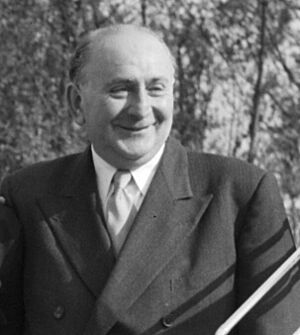Vilém Tauský facts for kids
Vilém Tauský (born July 20, 1910, in Přerov, Moravia; died March 16, 2004, in London) was a famous Czech conductor and composer. When World War II began, he moved to the UK. He was one of many talented musicians who came to live and work in Britain during that time.
Contents
Vilém Tauský's Life Story
Vilém Tauský came from a very musical family. His mother, who was from Vienna, sang Mozart's music at the Vienna State Opera. She even sang under the famous conductor Gustav Mahler. Her cousin was also a well-known composer of operettas, Leo Fall.
Early Studies and Career
Tauský studied music with Leoš Janáček, a very important Czech composer. Later, he worked at the Brno Opera, helping singers learn their parts. He also learned from other great teachers like Vilém Petrzelka (for composing) and Zdeněk Chalabala (for conducting). When he was just 19, he got a big chance. He conducted Puccini's opera Turandot in Brno because Chalabala was sick.
Moving to the UK
Because Tauský was from a Jewish family, he had to leave his home when the Nazis became powerful. He first moved to France. Later, he joined the Free Czech Army to fight against the Nazis. In 1940, after France was taken over, he managed to reach the UK. He arrived with other soldiers on a ship in Newport.
While in the army, he used his musical talents. He led military bands in France and later in the UK. The famous composer Bohuslav Martinů even wrote a piece called Field Mass for Tauský's band.
Music During Wartime
During the Coventry Blitz, a terrible bombing raid on November 14, 1940, Tauský was nearby. His army unit helped search for survivors in the ruined city. To remember the people who died and the destroyed Cathedral, he wrote a piece for strings called Coventry Meditation. It was first performed in London in 1942. He received a Czech Military Cross and later the Czech Order of Merit for his service during the war.
Tauský's Work in Opera
From 1945 to 1949, Tauský was the music director for the Carl Rosa Opera Company. After that, he conducted BBC orchestras in cities like Belfast, Glasgow, and Manchester. Then, from 1951 to 1956, he became the music director of Welsh National Opera.
Famous Performances
In January 1951, he made his first appearance at Covent Garden, a very famous opera house, conducting The Queen of Spades. On December 26, 1953, he did something amazing. He conducted two different operas on the same day! In the afternoon, he led Humperdinck's Hansel and Gretel at Sadler's Wells. Then, in the evening, he conducted Giuseppe Verdi's Il trovatore at Covent Garden. From 1966 to 1975, he was also the artistic director for the Phoenix Opera touring company.
Introducing New Operas
Tauský helped bring many Czech operas to the UK. These included Smetana's The Kiss in 1948 and Janáček's Osud in 1972. He also conducted the first performances of many British operas. For example, he led A Dinner Engagement and Nelson by Lennox Berkeley in 1954. In total, Tauský conducted 26 first performances of British operas and operettas.
Light Music and Later Life
Vilém Tauský was the first foreign conductor in 100 years to lead the Band of the Coldstream Guards. He also taught and judged at music schools and brass band competitions. From 1956 to 1966, he was the main conductor of the BBC Concert Orchestra. He often appeared with them on the popular radio show Friday Night is Music Night.
Teaching and Composing
Between 1966 and 1992, Tauský was the director of opera and head of conducting at the Guildhall School of Music and Drama. As a composer, one of his most popular pieces was the Harmonica Concertino. He wrote it in 1973 for the harmonica player Tommy Reilly. This piece was even used for a ballet in New York!
Some people thought of him mainly as a "light music" specialist because of his work with the BBC Concert Orchestra. However, he was also very skilled in more serious classical music.
Memoirs and Honors
In 1979, Tauský published his life story in a book called Vilém Tauský Tells his Story. His wife, Peggy Mallett, helped him write it. That same year, he was given the special honor of being a Freeman of the City of London. In 1981, he was made a Commander of the Order of the British Empire (CBE). He and Peggy also wrote a book about Leoš Janáček in 1982.
Selected Works
Vilém Tauský composed many different types of music throughout his life. Here are some of his works:
- 1925 - Cello Sonata No 1
- 1930 - Symfonieta for orchestra
- 1930 - Three Songs for soprano & piano
- 1932-8 - Three operettas: Marcella, Keep Smiling, Little Girl in Blue
- 1934 - Christopher Columbus, play with music
- 1935 -The Lost World, music for documentary film
- 1939 - Variations for Piano on an Original Theme
- 1940 - Two Military Marches: The Czechs are Marching, Call to Arms
- 1941 - Coventry: A Meditation for String Quartet
- 1942 - Variations on a Welsh Tune, piano
- 1943 - Interim Balance, music for documentary film
- 1945 - Rhapsody on Tunes by Smetana for piano & orchestra
- 1950 - Concert Overture for Brass Band
- 1957 - Fantasia da Burlesca for violin & orchestra
- 1964 - Cello Sonata No 2
- 1965 - Essay for solo viola
- 1965 - String Quartet
- 1973 - Concertino for Harmonica, Strings, Harp & Percussion (written for Tommy Reilly)
- 1975 - Ballade for cello and piano
- 1978 - From Our Village, three movement suite for orchestra
- 1980 - Suite for Violin & Piano
- 1998 - Serenade for Strings
See also
- List of émigré composers in Britain
 | Kyle Baker |
 | Joseph Yoakum |
 | Laura Wheeler Waring |
 | Henry Ossawa Tanner |


